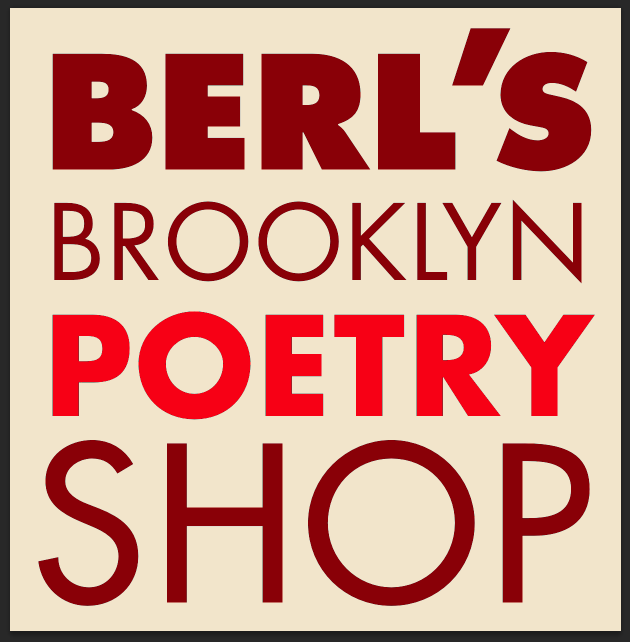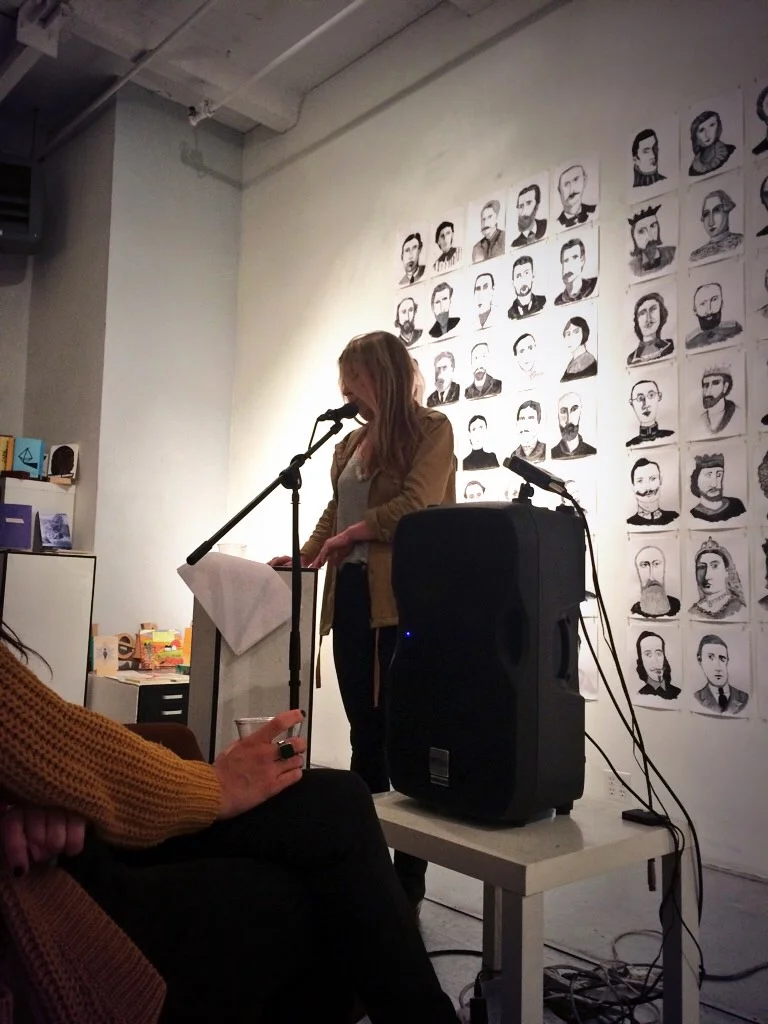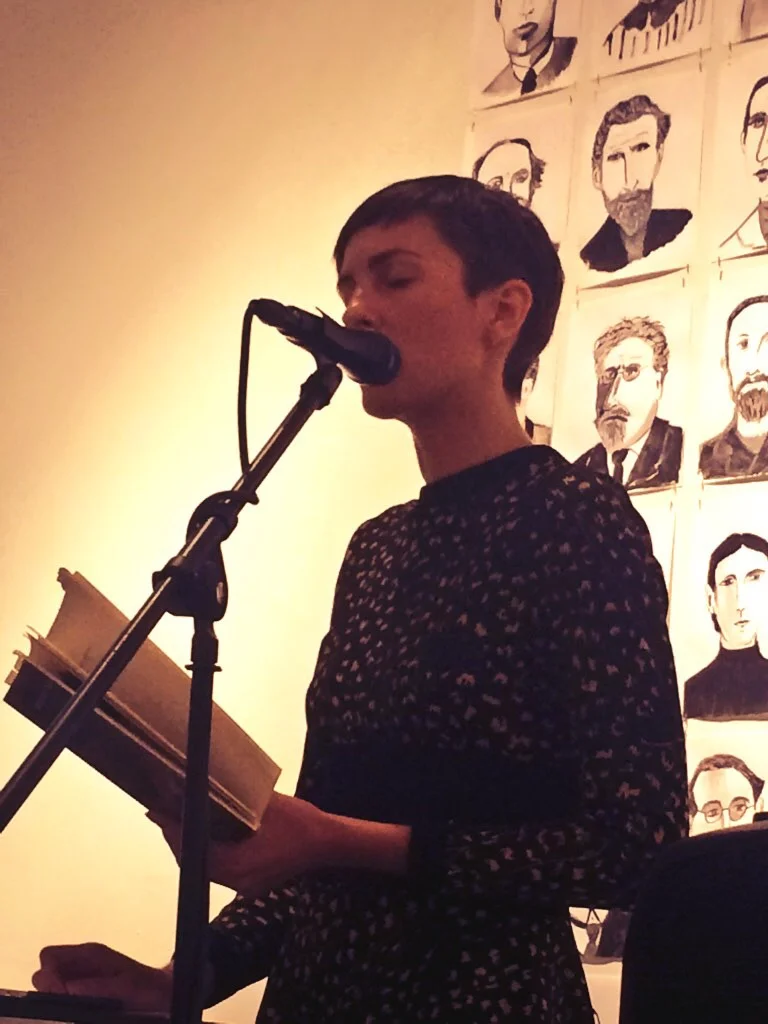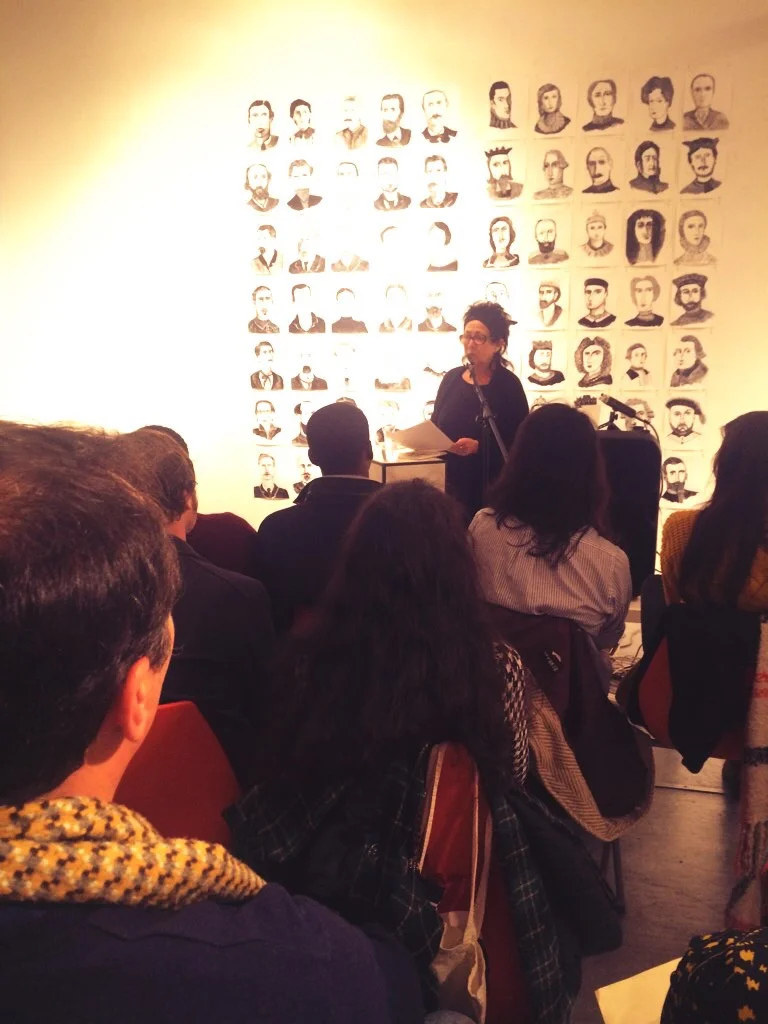A Reading with Dara Wier, Adam Fitzgerald, Sarah Rose Nordgren and Bridget Talone
Here are notes by Farrah and Jared for our introductions to the event:
SARAH ROSE NORDGREN writes “Content usually roots story to ground, but I sense it shivering around you when you turn half-asleep in bed, disturbed”
I felt these lines hovering as we were preparing the introductions for today and reading these poets, all of whom are playing in a space where content both tethers and shakes loose into an unknown universe. I love the idea of a poem’s content not only shivering around (as a sort of emanation of the cold world) but also seems to sort of snuggle the dreamer against the half-felt cold. And how poetry then becomes the disturbed dream that floats into the world.
Dara Wier
A kind laughter in Dara Wier’s poems spreads over the world, like a sprinkle of warm rain. She writes: “Like a rubber tombstone in a hailstorm”
There’s a balletic quality to her work, which seems sane and serene even when making hairpin turns or leaps into reverie, so that when it gets fantastical Dara’s tone gives it less a feeling of lifting off than of suddenly yoking to an unexpected ground, giving the chains a tug and maybe peeling back a bit of reality
“On the way a tree dematerializes and passes through your brain”
“I saw you quarter and corner and replace yourself with a turnstile"
Some poets when they seek to innovate ways of pacing poem deconstruct the line, or add spaces between words, or hyphens, or even quotation marks. Dara in her book REVERSE RAPTURE used parenthesis and I think in a sense she is a poet of the parenthetical - like someone quipping in your ear in the back of the room during a poetry reading. “One night one child wandered lonely as a cloud, or so it’s been reported.” The parenthesis is a funny effect in pre-announcing its own lack of necessity while turning out to be often where the real work happens. Parentheses are generous and as they stack one after the next they become like little adjacent universes that may or may not close.
Thus her poems unfurl in a subjunctive mode that is kind, reaching out, wry, and full of lush and playfully surreal analogies and hypotheticals “If I were not a socket wrench and I were a lug nut” or “Dream-ruffling things, as if we were carrying something as heavy as it is invisible” or “God is made of ice”
I see her work as a sort of opposite number to TS Eliot’s objective correlative in which the metaphors conform to emotions – instead we have in Dara a subjective correlative in which emotions restructure the world, irradiate objects with tone. She writes “what a pity feelings have feelings too” and very perceptively “I notice how often a smile is an apology”.
Her poems overflow with mystery whether it is human relationships : “I wonder what you wonder when you wonder” or language (as when dara pitches a poem into ambiguous spaces as in the lines “every other house was empty / every other house had someone living in it” so the poem takes place in the flicker between possibilities) or the self is a mystery. “Who signed your birth certificate” she asks in a poem called “Good Detective” and in another poem: “when they turned me over they found my back stamped with cryptic alphabets."
“I washed my brain and hung it to dry” The effect of reading her is a kind of mental floss – reading her work feels invigorating.
Sarah Rose Nordgren
Her book is very poetics of space. Like a glossy magazine called “Fairy Tale Living” Fairy tale people have the same problems we do. “inflicting only the right kind of violence"
Feminist: I remember seeing a show in Chelsea a few years ago depicting women in contorted poses weaving their bodies akimbo into wicker chairs. I was reminded of this in her line “the dark mahogany of your skin blends in perfectly with the other furniture”. bolts of lightning like this strike frequently in Sarah Rose’s work, often relating to a deconstructive, desolated view of marriage and the domestic “I get more creaturely every year” in a poem called “THE WIFE”. One of my favorite poems quips names for a country house such as ‘nightmare of ancestors’ “hungry attic’ and “broken monument”.
The book ends “to to be a mansion steering itself”. Elemental. There is a sense of poetry as a haunted house, or perhaps not haunted but alive.
Adam Fitzgerald
An aura of elegance that pre-exists content. “the rotund ministries of, say, moonlight” “vague pleasure of doubt." It’s a synesthetic sensibility that drapes objects and spaces in off colors to generate energy and mystery. “peach atrium” “azure doorway” “purpled cypress” “lilac covering their forehead" “all these matters of radial color. Schemes of highbrow living that used to interest you”
This mixture of the allusive and sonorous, the ironic and the emotionally committed, creates odd moments of humor that seem right “like a girl, dapper, chivalrous” so the gender flip clatters while we still get these just-so modifiers. These effects lend gravitas to occasions when Adam step forward to claim “There’s a big war being fought right now and it’s being fought without you
Sitting with Adam Fitgerald’s work makes me feel as though I could be sitting at a table with Edith Wharton or Katherine Mansfield. It has a timelessness that invokes a past or a future or a present, a particular diction “resting like the uncle-we-loved’s hat” and a particular way of being with people that doesn’t reek of the internet or the bombardment of popular culture but rather of culture “a town dreams itself along a river.” The Fitzgerald Culture is permeated with travel and books and reading and writing, feels as though we stopped at a podium in a far away museum to search for a familiar name in a sign-in book. Yet Fitzgerald Culture is not formal nor without anger “I will accost you like an idea caught in a fan”, but takes in snow the way snow is cold in Dr. Zhivago or in a painting. He effortlessly courts imagination and in so doing gives credence and voice to the dimension of poetry where those of who like it have thought and understanding. Adam Fitzgerald gives us camaraderie.
Bridget Talone
In an essay she wrote in grad school Bridget described how her first need for poetry came in adolescence in helping to process the trauma and distress relating to her father’s grave illness; she writes: I wrote in order to express my most painful and unsayable thoughts and feelings—to make some sense out of his, and my own, suffering. I wrote (in the words of artist & sculptor Louise Bourgeois) because my emotions were “inappropriate to my size.”
I think Bridget’s poetry often interrogates these questions of the scale, the giant and the small. Writing into this vein, she has: “my self foamed over its limits, toothless.” And, a longer passage: I touch my lips to your heart-fingers, wet-fingers, fingers dipped in shadowliquor. / when I gigantize my other senses”
The speaker in Bridget’s poems seems half gargantua, half infinitesimal, constantly seesawing between these disproportionate extremes of scale, king kong one minute, a tiny insect the next: “I’ll be all we swallowed: be figurine and miracle:” “the world a blinding ankle—“ “Now tell me how we became bee & crawled inside”
Her poems are littered with close up flowers. (“a flower-based suffering” Bridget writes, and “Tell the flower to stop over-sharing.”) and even closer up teeth (“The thoughts are cutting their pink teeth on you,”)
Pink comes up a lot – skin pink, perhaps, and bruise red. “Salt visions in the pink night, “ OR “I replayed our last looks / until they were pulpy (red & pink):”
She is writing about the bewilderment of grief. “When you died, you took the bugs and the music”
Paul Bunyan comes up in a poem of Bridget’s that Verse Daily republished from Salt Hill. She writes “ the only person I ever wanted to drown in my whole life was Paul Bunyan.” So there we have a profound fantasy about size – of there being an actual paul bunyan next to whom you would seem tiny, and then of being so big you could wield some hypothetically enormous body of water in which to drown this giant. I suppose that this enormous watersource is not so hypothetical though it’s just poetry.





